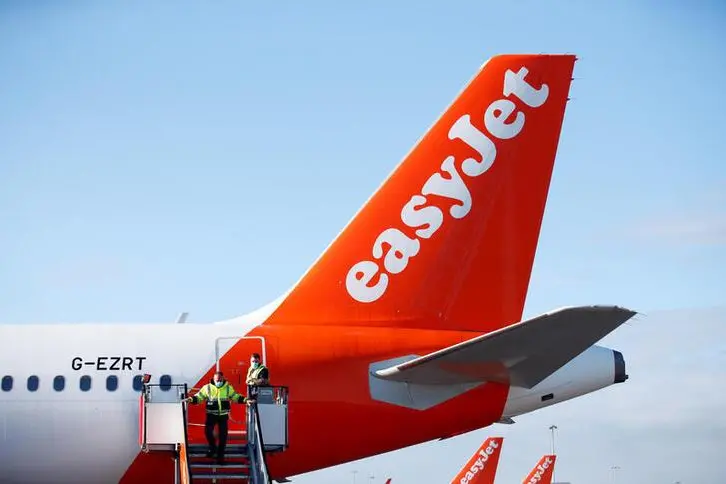PHOTO
LONDON - EasyJet has rejected a takeover approach from Wizz Air that would have created a low-cost airline to rival Ryanair, opting instead to raise $1.7 billion from shareholders and go it alone in an industry battling to recover from the pandemic.
EasyJet declined to name its suitor, but a source familiar with the matter told Reuters it was Wizz Air. Wizz also declined to comment.
EasyJet said the all-share approach fundamentally undervalued its business, and added the potential bidder had since said it was no longer interested in a deal.
The approach was "highly conditional in its nature which made it very uncertain in terms of the deliverability of it," easyJet Chief Executive Johan Lundgren told reporters, without giving details.
EasyJet said the fundraising would strengthen its balance sheet should the COVID-19 downturn continue and allow it to take advantage of an expected recovery in Europe's aviation market by, for example, expanding its presence at key airports by buying more slots.
"I believe this is really a once in a lifetime opportunity," Lundgren said.
EasyJet, which during the pandemic sunk to its first ever annual loss and cut 4,500 jobs, is aiming to steal market share from legacy carriers like British Airways owner IAG and Air France-KLM as they retract their short-haul operations.
But it faces stiff competition from Ryanair, Europe's largest budget airline, and rapidly expanding Wizz, both of which have recovered faster than easyJet over the summer.
Wizz has a stronghold over eastern European destinations like Poland and Romania, while easyJet is well-positioned in countries including Britain, Italy, Switzerland, Germany and France. Adding to their potential good fit, both also operate all-Airbus AIR.PA fleets.
EasyJet has a market capitalisation of 3.33 billion pounds ($4.6 billion), while Wizz is worth 5.1 billion pounds.
"EasyJet has always been a strategic target for Jozsef Varadi," said a senior industry source of the Wizz CEO.
Based on passenger data from last year, when fewer people travelled during the pandemic, a combination of the pair would still lag Ryanair by almost 20 million passengers.
Wizz's approach comes after its share price has outperformed easyJet's during the pandemic.
Shares in Wizz had bounced back to pre-pandemic levels by November 2020 and hit an all-time high of 5,595 pence in March. EasyJet's stock, by contrast, had recovered 70% of its pre-pandemic value by May 2021 before starting another decline.
RIGHTS ISSUE
Illustrating the ongoing travel slump, easyJet said that over July-September it expected its capacity to be about 57% of pre-pandemic levels. Ryanair flew around 75% of its normal passenger numbers in August, and Wizz flew over 85% that month.
EasyJet said it was seeing slot opportunities at Paris Orly, Amsterdam, Porto, Lisbon, Milan Linate and possibly at London Gatwick and that new funds would help build its network.
The rights issue is the second time the airline has tapped shareholders during the pandemic. It raised 419 million pounds in June 2020. At that time, the group's biggest shareholder, founder Stelios Haji-Ioannou, did not participate.
Shares in easyJet, which were trading around 1,550 pence before the pandemic hit in early 2020, fell as much as 14% in early deals to 680 pence, the lowest since January, reflecting the big discount proposed for the rights issue.
They regained some ground to trade down 10% at 713 pence at 0938 GMT, while Wizz was down 3%.
Under the rights issue, shareholders would be able to buy 31 new shares for every 47 existing ones for 410 pence each, a 35.8% discount on the theoretical ex-rights price of 638 pence per share on Sept. 8, easyJet said.
The issue is underwritten by BNP Paribas, Credit Suisse, Goldman Sachs, Santander and Societe Generale.
EasyJet also announced a new committed $400 million secured revolving credit facility.
($1 = 0.7264 pounds)
(Additional reporting by Paul Sandle Editing by Kate Holton and Mark Potter) ((sarah.young@thomsonreuters.com; +44 20 7542 1109; Reuters Messaging: sarah.young.thomsonreuters@reuters.net))





















